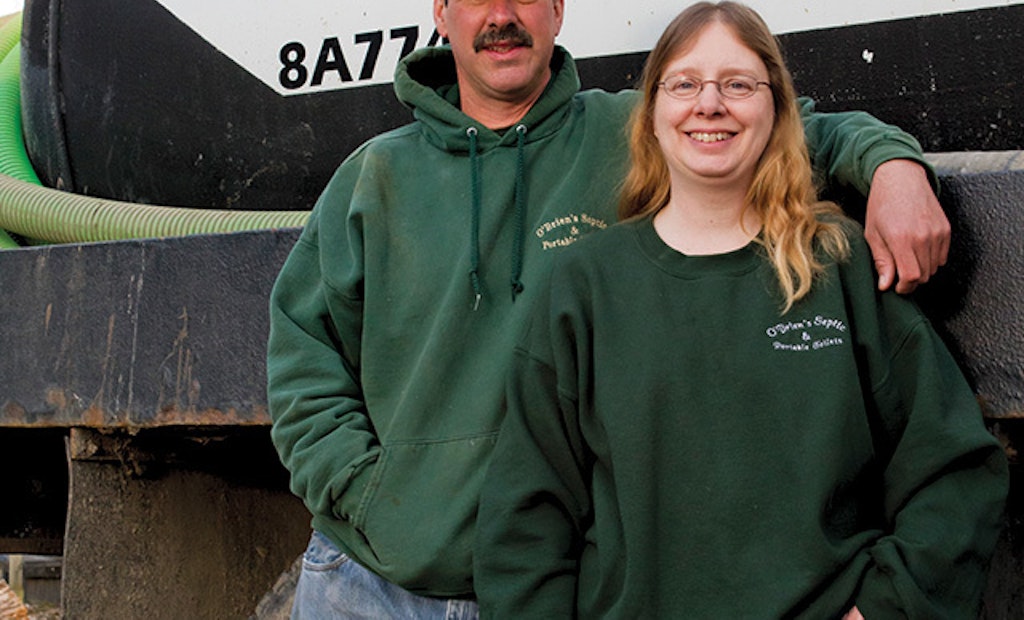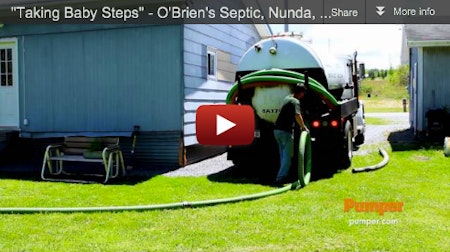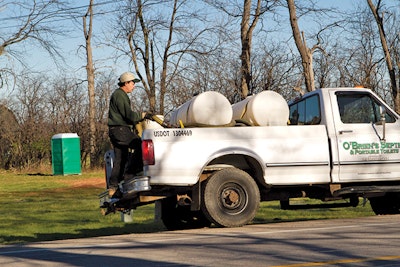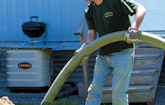
Interested in Trucks?
Get Trucks articles, news and videos right in your inbox! Sign up now.
Trucks + Get AlertsFortified by the belief that if you can change a baby's diaper, you can clean portable restrooms, Kathy O'Brien of Nunda, N.Y., came into the industry with no experience. Her husband, Sean, a welding shop supervisor, pumped septic tanks on evenings and weekends.
A mutual understanding to refuse to fail has driven their learn-as-we-go adventure. At the outset, Kathy O'Brien's main goal was to change the way people feel about using portable sanitation or even walking up to units. "The ones I had used were nasty," she says. "I want people to see my units and not be afraid to open the door."
Debuting in 2003, O'Brien's Septic had 30 restrooms in the field and pumped 15,000 gallons of septage. Successively, the company exceeded annual financial goals she set by $10,000 to $20,000. By the end of 2011, they owned 185 units, hauled 204,650 gallons of septage, and had purchased another small pumping company.
Working mom's dream
Kathy O'Brien, then 35, was working full time as an office assistant to pay a babysitter to watch their 3- and 5-year-old daughters. Wishing to stay home with them, she evaluated her situation and the possibility of self-employment. A former co-worker of Sean's working in the sanitation business told the couple there would always be a demand for garbage collection and pumping septage.
"Hauling garbage held no appeal," Kathy O'Brien says. "That left portable sanitation and septic tanks."
Many Livingston County residents have conventional gravity onsite systems with drainfields. The county's two septic companies operated beyond a 25-square-mile radius of Nunda, the couple's proposed service area. The county also had no portable restroom companies. "Sean and I talked about the physical aspect of the work, but it didn't sound too bad," O'Brien recalls. "We decided to look for customers."
The team approached construction companies and golf course managers to ask how they liked their portable sanitation service, then guaranteed theirs would meet or exceed expectations. Most welcomed the promise. They also talked to village and town event officials about providing portable sanitation and got the nod.
With customers lined up, the O'Briens bought 75 pre-owned fiberglass portable restrooms and a 1997 Ford F-250 pickup truck with slide-in unit to transport them. They also bought a 1985 Chevy with 2,500-gallon steel tank and Moro pump. Back home, they removed graffiti from the restrooms and painted them white. "I still have some in service because customers love them," says O'Brien.
Telling portable sanitation customers that the company also pumped septic tanks jump-started that branch of the business, as did advertisements in local papers and PennySaver publications. "The word of mouth and PennySaver response was great," says O'Brien. "By the end of 2003, Sean was servicing 15 pumping customers on evenings and Saturdays."
Dream meets reality
With a cellphone on her belt, O'Brien put her eldest daughter on the bus for kindergarten, then strapped the youngest into the pickup truck before servicing routes and picking up or making deliveries. She was home in time to meet the school bus, do office work, and answer the phone. "I dislike leaving messages and vowed that when people called my company, they would talk directly to the owner," she says.
While able to spend more time with her daughters, O'Brien didn't anticipate how deeply the phone would cut into their personal time. "I pride myself on answering it, especially since most people are calling because they have sewage backing into their homes or toilets not flushing properly," she says. "However, the negative side was never getting away from the phone."
Always a perfectionist, one of the hardest things O'Brien did was lower her expectations on the appearance of the house. As soon as the girls were old enough to help with cleaning, laundry and cooking, O'Brien put them to work.
"They weren't happy about it, and didn't always do things the way I would have done them," she says. "Lowering my standards to 'good enough' was very difficult, but nitpicking because something wasn't done my way would have been counterproductive."
O'Brien enjoyed the physical work associated with portable sanitation because it kept her in shape and mentally alert for afternoons on the computer. For the first two years she deployed 30 restrooms, then demand took off. Today, the inventory includes Integras from PolyPortables and Legacy, PJN3 and two ADA units from PolyJohn Enterprises. There are three Global and two World Care ADA units from Satellite Industries, and four Boudoirs from PolyPortables for weddings, graduations, weekend parties and other special events.
The company pumps 10 to 25 tanks per week in the summer and six to 10 in winter. Every February, O'Brien goes through the database and determines who needs service.
Courtesy equals success
O'Brien attributes the company's success to customer service. "Being there when we say we'll arrive, returning calls promptly, talking and looking like professionals, and cleaning bathrooms and septic tanks to the highest standard made this company," she says.
Construction accounts for 20 percent of portable sanitation in summer and 10 percent in winter. In summer, golf courses, state and local fairs, arts and craft shows, and private events bring in the most restroom revenue. Permanent accounts and septic pumping generate income through the winter.
Learning how to operate the equipment came quickly; coping with the debris in the portable restrooms took longer. O'Brien nearly had a heart attack when she lifted a seat and something blue blasted out of the tank at her and out the door. "A bird had apparently fallen down the stack and become trapped," she says. Unharmed but drenched in deodorant, it flew away into the rain.
With business on the rise, the couple cleared some land on their 36 acres and built a 46- by 30-foot, three-bay garage. Sean maintains the trucks and cleans them in the driveway using a 3,000 psi Honda pressure washer.
Although the business was supporting itself, Sean continued working full-time and pumping evenings and weekends. He also completed the National Association of Wastewater Technicians' installer course. "Our code doesn't require removing the lid to pump a tank, but that's how we have always done it," says O'Brien. "Most people know the tank's location and have it dug up for us. If not, I follow Sean with the pickup truck pulling the New Holland backhoe on a trailer."
Sean also services seven restaurant grease interceptors every six months and holding tanks in state park and forest restrooms. In summer, many residents camp on their own land and he pumps the tanks in their recreational vehicles. The septage goes to municipal wastewater treatment plants.
Time for change
By summer 2010, O'Brien was working 12- to 14-hour days. She had urged Sean to join her full time for two years, but he was reluctant to give up his company health insurance and the extra income. "The business was growing faster than I could keep up," she says. "At the end of the year, I'd spend two weeks entering transactions into the computer. The paperwork was overwhelming. In hindsight, I should have hired an office assistant years ago."
In May 2011, O'Brien hired Mark Harrington part time to service routes and deliver portable restrooms, leaving her free to answer phones and process paperwork. Sean joined the company full time in June 2011. The lynchpin in their decisions was the option to buy a 20-year-old pumping company, which enabled the couple to expand and serve a 60-mile radius.
During the transition, a message on the owner's answering machine alerted customers that she was selling the business, and that they should call O'Brien's for service. As the closing date approached, O'Brien routed all calls to her cellphone. The acquired company came with a receiver and flushable transmitter from Prototek Corp., and a 1998 Freightliner with 2,600-gallon steel tank and Masport pump.
Piece of cake
Incorporating the second company was easy for O'Brien. "After keeping our records for nine years, the work was nothing new, and this was a small company doing four to six pump-outs per day," she says. "The biggest thing was keying their database into my computer." The purchase added more than 500 names to O'Brien's customer list.
O'Brien plans to grow the company as much as possible. Sean recently began installing gravity onsite systems: 1,000-gallon concrete septic tanks discharging to perforated pipe in the drainfield. Branching into real estate inspections and hiring more employees are in the future.
A challenge O'Brien anticipates is hiring people with the right mindset to clean restrooms and septic tanks, while meeting her expectations of customer service.
"We were fortunate to find Mark, because I believe he feels ownership toward the company," she says. "He does an awesome job."









